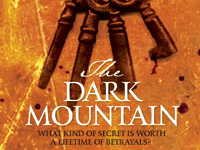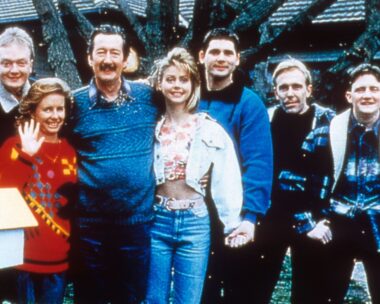Exclusive extract fromThe Dark Mountainby Catherine Jinks, the Great Read in the June issue of The Australian Women’s Weekly.
The day itself was hot and sultry. A late storm threatened in the slow gathering of dark clouds to the north, but from sunrise it was evident that there would be no early relief. I remember so clearly every passing minute of that day, though all the days before it seem a golden blur, with here and there a break in the mist: the vivid image of a fourty-pound turnip, displayed in the milking yard and encircled by exultant men; my newly christened brother, a mass of lace, cradled in my father’s arms; a pink cockatoo trapped in the nursery, flapping from corner to corner, it’s drifting feathers later retrieved from inside the grate. Even my father’s death seems to have cast no great shadow – not one, at least, that I can discern from this distance – though I know (for I was told) that it was terrible and protracted; that he was deprived of all his faculties by the fever and the pain; and that Louisa’s crying tormented him so much that she was removed from his presence. Perhaps the rest of us were, also: cannot tell. I recall nothing of his deathbed. Nothing of his rapid decline. My memories of my father are in every instance suffused with happiness, for he was a good man, kind a just, as all who dealt with him are pleased to testify. There was at least one neighboring family which owed its complete happiness to my father. Long before I was born, it was Papa who noted the anguish of his convict servant, John Hollands. It was Papa who arranged that John’s wife Mary and their five children be brought from England to New South Wales. Through my father’s patronage, Mary Hollands received a grant of land in Sutton Forest, and her husband was assigned to her. Thus was the family reunited, to my father’s eternal glory. In this, as in every other facet of his life, he displayed the generosity of spirit, the radiant common sense and the patient determination that earned him the general respect of the colony.
It seems to me now, looking back, that his noble influence could be felt even after his death. Or was I too young to retain any ominous impressions? I was six years old when my father died. Between that date and the incident at Belanglo, I experienced nothing that left me with any lasting sense of dismay. I saw pigs feasting on wheat stubble, I picked peaches and chased hens. I scolded my sister Emily for playing near the creek, and overturned one of the pans in the dairy. Not once was I beaten, Not once did I run away and conceal myself.
Yet the storm clouds must have been gathering long before that fateful day in 1836. For George Barton was among us – and John Lynch, too. It seems incredible now, but they have left no mark on my early recollections, though I know my father had hired Barton as overseer; that she herself was not responsible. And she told me of an event which occurred not one week after my father’s death, when John Lynch disobeyed a direct order.
‘His character was always bad,’ she announced, as much to distract me as anything else. (This must have been in Sydney, for she was poring over a newspaper article about Lynch’s execution for mass murder.) ‘Had we only known then what we know today!’ she said. ‘But I never liked him. He was lazy and insolent. Even at that time, before he committed his most heinous acts, his disposition struck me as being utterly flawed. He refused to yoke the bullocks. When instructed to take a dray out to Bargo Brush, he refused to yoke the last two bullocks – I don’t know why.’
For his refusal, John Lynch received a sentence of fifty lashes from the magistrates’ bench. This, at least, was my mother’s story, and I have no reason to disbelieve it. I must admit, though, that it does give me pause. Perhaps my father did not extend his influence from beyond the grave. Had he done so, I doubt that John Lynch would have been brought before the local magistrates. Very few of the convicts under my father’s protection ever were; his strength of character was such that, on those rare occasions when his assigned men did misbehave, he dealt with them in his own fashion, firmly but fairly, and never in contradiction of the laws of the land.
If more settlers had been like Papa, this country would have had a much happier birth. Needless to say, I saw nothing of John Lynch’s punishment. I was blind to any discontent among the huts that stood behind our great house. If the assigned men were disrespectful or if they suffered any unfair usage at the hands of their overseer, I did not witness it. Like any young child, I saw only what lay directly in front of me: the plum pudding dispensed at Christmas; my cambric muslin frock; the candle moulds; the grindstone; the smooth, alluring handrail on Oldbury’s staircase, which curled at the end like the spiral of a triton. My interests were narrow but keen. I loved my mother’s sketchbook and her camel-hair paint-brushes. I enjoyed mounting a stick, and racing against Emily when she was similarly mounted. I adored the skittish young kangaroo who came to be fed every evening neat the stockyard. Upon waking, I would throw off my covers, eager to greet the day.
On this particular day – January the thirtieth, 1836 – I rose early, roused by the clatter of the buckets and the warbling of magpies. At the time, Oldbury’s nursery was positioned directly over the front portico, facing south-west; therefore no pearly fingers of sunlight were creeping through the window shutters. I did not share my bed then, for Emily had her own (as did James), and Louisa, though nearly two, still slept beside my mother who was concerned for her health. Louisa was a sickly child, who grew into a frail adult. I don’t believe that Mama ever ceased to fret over her, from the very moment of her birth. Indeed, there are children who seem to enter the world reluctantly, and whose grasp of life remains weak for as long as they come to live. Louisa was one such child. The same could not be said for the rest of us, however. We were all sturdy enough. Being raised on a farm must have constituted some advantage, in this regard; we were not so exposed to the epidemics that swept through Sydney, and our food was almost always fresh. Furthermore, our supply of water was very good. From the window of the nursery I could look out across the gently sloping front garden – over its picket gate and incipient hawthorn hedge – towards the creek, which never ran dry. Not ever. Even during the great drought of 1839, the creek at Oldbury continued to flow. No doubt this is why my father chose the spot, for in other respects Oldbury could, perhaps, have been better situated. It was so very crammed up against the foot of Gingenbullen that one felt perpetually encroached upon – since Gingenbullen, though hardly more than a hill (and a flat-topped hill, at that) still possessed a powerfully solid presence. It was impossible to ignore. Cloaked in dark, dull foliage, and crowned with certain moulds or tumuli left by ancient native tribes, it was altogether too close for comfort.
So was the creek. During heavy rains, the low ground could get very boggy. As a child this did not concern me – in fact I delighted in mud at that age – but now I wonder if I was entirely healthy, living pinched between a steep rise and a sodden morass. Not that anything was sodden on that day in January. It had been dry for some weeks. Pulling open a shutter, I found myself peering out at a parched and dusty scene. Even in the softening light of sunrise, the grass in the pastures beyond our front garden was leached of colour, pale and crisp. The sky to the west was cloudless.
‘What are you doing?’ Emily whispered. She had swept aside her white bed-curtains, and was struggling to disentangle herself from her twisted sheets, (Emily always slept as if being tossed on a griddle.) ‘Where are you going?’
‘Shh!’ I closed the shutter. ‘You’ll wake James!’
‘Is it time for breakfast?’
‘Shhh!’
I had already learned to dress myself, for with three younger siblings, I had been given little choice in the matter. Emily was not so well trained. She needed help with her buttons and her shoes – help that I gave her, though grudgingly. Only her hair was beyond my skill. We both wore our hair in rags when we went to bed, Emily because her hair was dead straight, and myself because my hair was inclined to frizz unless carefully tended. Looking at the crop of blue cotton sausages that dangled from my sister’s head, I felt as helpless as a landsman confronted by a tangle of ship‘s rigging.
‘We’ll brush our hair later,’ I hissed, and crept out of the nursery onto the landing. To my surprise, I saw that Mama’s bedroom door was slightly ajar, and I wondered if Louisa had been sick during the night. But my train of thought was suddenly interrupted, for Emily had slipped past me and gained the stairs; she had taken the lead in a way that I found unacceptable. Who was the elder of us, after all?
‘Wait!’ I commanded. ‘Wait for me!’




